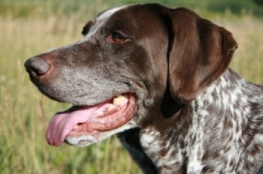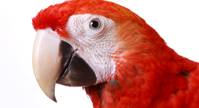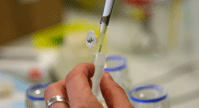Cone Degeneration (CD)
Description:

Cone Degeneration (CD) is an autosomal recessive disease that occurs in the German Shorthaired Pointer, the Alaskan Malamute, and several other breeds. Cone Degeneration disease causes day-blindness. This is caused by a lack of cone function in the retina of the eye.
CD disease causes degeneration of the retinal "cones" that respond primarily to bright daylight, resulting in what is referred to as "day blindness." Cone-degenerate pups develop day-blindness and photophobia between 8 and 12 weeks of age - the age when retinal development is normally completed in dogs. Symptoms of CD are present only in bright light and the dog's vision is not affected in dim light.
Cone Degeneration is inherited as a recessive disorder. Dogs with one copy of this mutation are known as carriers. Dogs that are carriers typically do not show any symptoms of the disease. These dogs can still pass on a copy of the mutation to any offspring. If two carriers are bred, there is a 25% chance per puppy born that it will develop symptoms of CD.
Sample Type:
Animal Genetics accepts buccal swab, blood, and dewclaw samples for testing. Sample collection kits are available and can be ordered at Canine Test Now.
Test Is Relevant to the Following Breeds:
- Australian Shepard
- Alaskan Malamute
- German Shorthaired Pointer
Results:
Animal Genetics offers DNA testing for Cone Degeneration (CD). The genetic test verifies the presence of the recessive gene and presents results as one of the following:
| CD/CD | Affected | The dog carries two copies of the mutant gene and is homozygous for the CD mutation. The dog will display symptoms associated with the disorder and will always pass a copy of the mutation to its offspring. |
| CD/n | Carrier | Both the normal and mutant copies of the gene detected. Dog is a carrier for the CD mutation and can pass on a copy of the defective gene to its offspring 50% 0f the time. |
| n/n | Clear | Dog tested negative for the CD gene mutation and will not pass on the defective gene to its offspring. |
Submit a Sample for Testing:
To submit a sample for testing please go to Canine Test Now.
To order a sample collection kit please go to order sample collection kits.
Cost per sample is $45.00. Please see our Canine Fee Schedule for all test rates.










